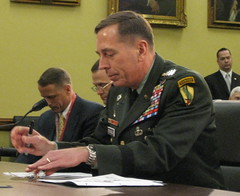Tuesday
Jun092009
Officials Set The Record Straight About Extremists And Pakistan
By Aaron Richardson-Talk Radio News Service
The popular opinion regarding Pakistan has been misrepresented by a headline-seeking media and conflicting U.S. policies with the Middle Eastern country according to a panel of experts and elected officials in Washington, D.C.
“The U.S. wants to create better relations with Pakistan, yet the bombing continues,” said panelist Samina Ahmed, South Asia Project Director at the International Crisis Group.
Congress has allocated millions of dollars to assist Pakistani civilians who have lost homes and belongings due to bombings, according to Wendy Chamberlin, President of the Middle East Institute.
“The media created a picture of them being anti-American, all Muslims do not hate America...do not call these extremists the Taliban, that means nothing, they are al-Qaida. The extremists are not popular there,” said Chamberlin.
Chamberlain said the media’s portrayal of Pakistan has had a devastating effect on the country’s international relations. U.S. Rep. John Tierney (D-Mass.), who was also a part of the panel, discussed strategy for ending extremism in Pakistan during a May hearing with the Subcommittee on National Security and Foreign Affairs.
“Campaign against extremism will not succeed with bullets and bombs alone. A critical part of the administration’s new strategy is to significantly increase civilian staffing,” Tierney said.
The popular opinion regarding Pakistan has been misrepresented by a headline-seeking media and conflicting U.S. policies with the Middle Eastern country according to a panel of experts and elected officials in Washington, D.C.
“The U.S. wants to create better relations with Pakistan, yet the bombing continues,” said panelist Samina Ahmed, South Asia Project Director at the International Crisis Group.
Congress has allocated millions of dollars to assist Pakistani civilians who have lost homes and belongings due to bombings, according to Wendy Chamberlin, President of the Middle East Institute.
“The media created a picture of them being anti-American, all Muslims do not hate America...do not call these extremists the Taliban, that means nothing, they are al-Qaida. The extremists are not popular there,” said Chamberlin.
Chamberlain said the media’s portrayal of Pakistan has had a devastating effect on the country’s international relations. U.S. Rep. John Tierney (D-Mass.), who was also a part of the panel, discussed strategy for ending extremism in Pakistan during a May hearing with the Subcommittee on National Security and Foreign Affairs.
“Campaign against extremism will not succeed with bullets and bombs alone. A critical part of the administration’s new strategy is to significantly increase civilian staffing,” Tierney said.




 Tuesday, June 9, 2009 at 3:57PM
Tuesday, June 9, 2009 at 3:57PM
Polls Show Israelis and Palestinians Want Two-State Solution
A series of recently released poll results suggest there may be peace in the Middle East in the near future. Nader Said, the General Director for Arab World for Research and Development, shared during a briefing that 78% of Israelis and 74% of Palestinians are willing to accept a two-state solution. He also stated that 95% of Israelis and 92% of Palestinians are willing to accept negotiated peace.
James Zogby, Founder and President of the Arab-American Institute said Arab-Americans and Jewish-Americans agree “on almost every issue, to the degree whereby [their] attitudes are within the margin of error of each other on almost all questions.”
Zogby also stated that the most troubling information he gathered was the partisan split in American opinion over the Arab-Israeli conflict: 70% of Obama supporters in the most recent Presidential election believe the President should “get tough on [Jewish] settlements [in the West Bank]”, whereas 71% of McCain supporters believe the President should not.
Jim Gerstein, Principal at Gerstein Agne, said that in a July 2008 poll, Jewish-Americans were asked what the two most important issues they would be voting on were. Only 8% cited the Arab-Israeli conflict as one of the two most important issues. In addition, 72% of Jewish-Americans approve of President Obama’s approach to the conflict.